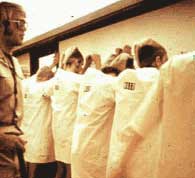 This is a very interesting list of videos Psych Central contributor Sandra Klume compiled. She writes, “Cognitive to clinical to social, the many applications of psychology reveal profound thoughts, human frailties and strengths. These are some of the best results, framed in video players.”
This is a very interesting list of videos Psych Central contributor Sandra Klume compiled. She writes, “Cognitive to clinical to social, the many applications of psychology reveal profound thoughts, human frailties and strengths. These are some of the best results, framed in video players.”
Click here to view the entire list. I’ve included the first five.
1. An Unquiet Mind: Personal Reflections on Manic-Depressive Illness. Kay Redfield Jamison doesn’t just suffer from bipolar disorder, she literally wrote the book. She co-authored the comprehensive textbook Manic-Depressive Illness: Bipolar Disorders and Recurrent Depression while doing research as a Professor of Psychiatry at Johns Hopkins. This talk was part of the tour for her awesome memoir An Unquiet Mind, and she is eloquently intimate about her own experiences. (00:30:29)
2. The Stanford Prison Experiment. (The link is no longer available because of copyright issues)Historic 1971 video (edited for an unknown vintage TV show) from the behavioral experiment by Philip Zimbardo, resulting in healthy people taking on unhealthy situational roles. Zimbardo recently discussed its relevance to contemporary war crimes in a speaking tour – watch The Lucifer Effect: How Good People Turn Evil. (00:05:24)
3. My Stroke of Insight: Jill Bolte Taylor at TED Talks. Rousing and inspiring lecture from a neuroanatomist about her internal observations and recovery from a stroke and the spiritual and psychological values she learned in the process. There’s also the Oprah webcast that followed her exposure from this sensational talk. Read her great memoir, offline. (00:18:44)
4. The Paradox of Choice features Barry Schwartz in a provocative TED Talk with a different view on social psychology – too much consumer choice makes us unhappy. Not just when you’re buying salad dressing; Schwartz looks at some wider sociological impacts of increased choice. (00:19:48)
5. Trapped: Mental Illness in America’s Prisons. Filmmaker Jenn Ackerman beautifully documents life on a psychiatric ward in a Kentucky prison. She interviews inmates, inmate helpers and staff about what it’s like to have a severe mental illness after most psych hospitals have closed and prisons take on a containment role. This film does reinforce some stereotypes, as wardens talk about being assaulted by patients and we hear tormented screams echoing through the cells. But we also hear that some of the men prefer to be locked in a prison cell 23-24 hours a day than free in a society that offers no help and “beats them down” until back in a cell. A short video but work continues as Ackerman plans to expand it into a feature film in 2009. (00:06:55)

